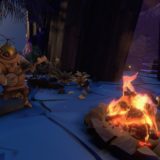

If you think you know what to expect from the soundtrack of a science fiction game, you probably haven’t tried Outer Wilds. With more than a handful of major award wins in categories like Best Game, Best International Indie Game, and Best World, the 2019 release from Mobius Digital and Annapurna Interactive provides a combination of narrative development and exploratory gameplay unlike any other game available on the market.
The adventure — which all takes place in a 22-minute time loop before the foreign solar system’s sun explodes — is unforgettable in numerous ways, and composer Andrew Prahlow made sure that the soundtrack would certainly be one of them. With a background that includes gigs ranging from Westworld to The Martian to Madden NFL 15 as well as composing a wide range of other shorts, shows, series, and feature films, Prahlow wasn’t about to shy away from taking the Outer Wilds’ soundtrack to unexplored terrain.
SPIN caught up with Prahlow to find out where his inspiration came from and how he utilized the handful of musicians encountered throughout the game (known as Travelers) to create one of the most memorable musical experiences in video game history.
SPIN: What was the process like in creating the soundtrack for Outer Wilds?
Andrew Prahlow: From the very beginning, Alex [Beachum, Outer Wilds’ director and designer] and I talked very conceptually about the parts where we were focused on how the Travelers and their instruments could work within the game. The first approach to provide a unique story behind the Travelers was that instead of having a Traveler each playing their own tune on their planet, they’re all playing the same song together like parts of a band. That’s slowly revealed over time in the game, but a musician would probably figure that out immediately — or within a couple of hours of playing at least. It’s sort of a representation of how music can bring people together no matter the distance, and it helps this huge universe feel a little bit more like home.
Outer Wilds is a very unique game with a fittingly interesting soundtrack, so how did working on it compare to your experience with previous projects?
This has been an interesting one because it was on and off in production for close to seven years. In that time, I’ve really grown as a musician and as a composer. I’ve known Alex [Beachum] for probably 10 years at this point, so I was on at the very early stages when it was just a prototype and he was still coming up with the ideas in his head. It’s been interesting to see how the game evolved over those years and to be able to use the tools that I learned from other projects to apply to the Outer Wilds soundtrack. I think it helped to make the score more unique for the alien civilizations because it’s like two or three different genres of music all interwoven together.
What was it like to move away from the stereotypical “sci-fi” soundtrack of electronic and orchestral music for this score?
It was a dream come true in a lot of ways because I was able to use a lot of my post-rock and indie-rock references from the late ‘90s and early 2000s to pull it all together. It gave it a very emotive score that feels very intimate but also grandiose in a way because I’m able to take these post-rock guitars and put them in the background so they can all just sit there blending together in the mix. It’s sort of an intimacy mixed with the scope of the solar system within the game.
As someone who’s worked on everything from films to studio albums, how is developing the soundtrack of a video game unique?
Game music is not linear in most ways — unless you’re scripting a cutscene or trying to piece together a bunch of different cues to help out a sequence. A lot of the time, you’re trying to think about how long a player might take in a certain area and how to make it feel cinematic and seamless when the timeline for each player is going to be different. It’s a lot of thinking about how things can loop or how things blend into the next track or fades out or fades in. On a record, it’s all linear. Everyone is going to hear it in the same order unless they turn on shuffle or something. That provides opportunities to come up with some really minimal ideas that can be incredibly effective when you pair it with the game.
What originally inspired you to start making soundtracks for video games?
I grew up playing a lot of games, and it was something that influenced my childhood in a lot of ways. I felt a really cool connection with the music culture and video games in the late ‘90s, particularly in extreme sports games like Tony Hawk and ATV Offroad Fury. Some of those games helped me get into punk rock over time, and that’s when punk rock was starting to head to Top 40 radio with pop-punk and things like that. Looking back at that nostalgically and remembering how games and music culture come together, it was always a dream of mine to have the ability to do that and help anyone playing these games get into music they hadn’t listened to before. I like that it helps people discover new genres, and I think it’s important that it can stand on its own. All of my favorite soundtracks can stand alone as a record while also fitting amazingly into the game or film.


Leave a comment